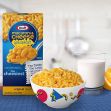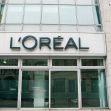Italians are famous for their pasta, their history, and their impeccable style. But now, the famous design of the “Classic Blue Box” of Barilla pasta is creating agita for the beloved international brand.
Matthew Sinatro and Jessica Prost filed a class-action suit against Barilla after spending $6 total on the boxed pasta. In court documents, the plaintiffs say they believed the dried pasta was made in Italy because the box was printed clearly with “Italy's #1 Brand of Pasta” and the Italian flag. The lawsuit accuses Barilla of false advertising, unjust enrichment and other misdeeds.
Like many companies around the world, Barilla is indeed based out of its home country: Italy. However, though the firm may reside in Parma, Italy, the company also has an office - and manufacturing facilities - in Illinois and New York.
The plaintiffs say they believed, based upon the iconic “Classic Blue Box,” that the pasta was indeed made in Italy and then imported to the US. Sinatro and Prost claim they were misled by Barilla because of the packaging of the pasta.
Beyond the store where Sinatro and Prost purchased their Barilla pasta, however, the website for the Italian-based food company clearly states its pasta is also manufactured in the US as well.
As the plaintiffs state in their lawsuit, they bought Barilla pasta based upon the prominent Italian flag and verbiage on the “Classic Blue Box.”
In court documents, the plaintiffs said they ”would not have purchased the Product, or would not have overpaid a premium for the Product's purported Italian origin, had they known that the Challenged Representation was false.”
Barilla attempted to get the suit dismissed. In its legal attempt to have the federal judge dismiss the class-action lawsuit, the Italian-based company said that“no reasonable customer could be deceived" by their packaging, because all of the American packaging is marked "Made in the USA with imported ingredients,” plus is printed with Barilla's Illinois-based office address.
The suit claims that Barilla "falsely and misleadingly" labeled its pasta as being from Italy, "in an effort to increase profits and to obtain an unfair competitive advantage.”
Barilla filed a dismissal motion, and Judge Donna M. Ryu reviewed the class-action lawsuit. Despite the website clarifying the fact that the pasta was also manufactured in the US, and the packaging showing a US address and “Made in the USA,” the judge ruled that the plaintiffs had, overall, a valid claim.
Judge Ryu partially denied Barilla's dismissal motion. She said the case would move forward but denied the suit’s request for injunctive relief since both Sinatro and Prost now know where the products are manufactured,” so they can’t be misled or financially harmed by purchasing the Barilla pasta, manufactured in Iowa.
The suit demands Barilla remove the Italian flag and other allegedly misleading Italian verbiage on their packaging. The plaintiffs also seek financial compensation.
In a public statement, the plaintiffs’ attorney said, in part, “Clear and conspicuous product disclaimers about origin exist to avoid consumer confusion and protect brands making truly authentic goods.”
A Barilla spokesperson appeared on the US news program Good Morning America,
saying they believe the judge’s decision, “simply reflects the Court's early conclusion that the lawsuit can proceed. Barilla remains committed to vigorously defend against these unfounded claims, as the wording on the box clearly states: 'Made in the U.S.A. with U.S.A. and imported ingredients.' We're very proud of the brand's Italian heritage, the company's Italian know-how, and the quality of our pasta in the U.S. and globally."
The new Barilla suit echoes a similar Texas case that accused Texas Pete hot sauce of false advertising since it allegedly led customers to believe it was made in Texas. In 2021, Phillip White purchased a bottle of Texas Pete in California and said he was tricked by the brand name including “Texas” and the image of a red cowboy on the label. When White realized the sauce was not made in Texas but has been made in North Carolina for 90 years, he filed a lawsuit.
In the Texas Pete class-action suit, White claimed the product "cheated its way to a market-leading position in the $3 billion-dollar hot-sauce industry at the expense of law-abiding competitors.” Texas Pete asked a judge to dismiss the case, saying its packaging “make(s) no such representation, either expressly or implied,” that it's made in Texas, and that the labels list Winston-Salem as the manufacturing location.
In a statement from Texas Pete, the company said, “Plaintiff’s incorrect assumption does not mean that a significant portion of the consuming public would make the same incorrect assumption.”
The court date for the Texas Pete suit is on January 19. A court date for the Barilla case has not yet been announced.






